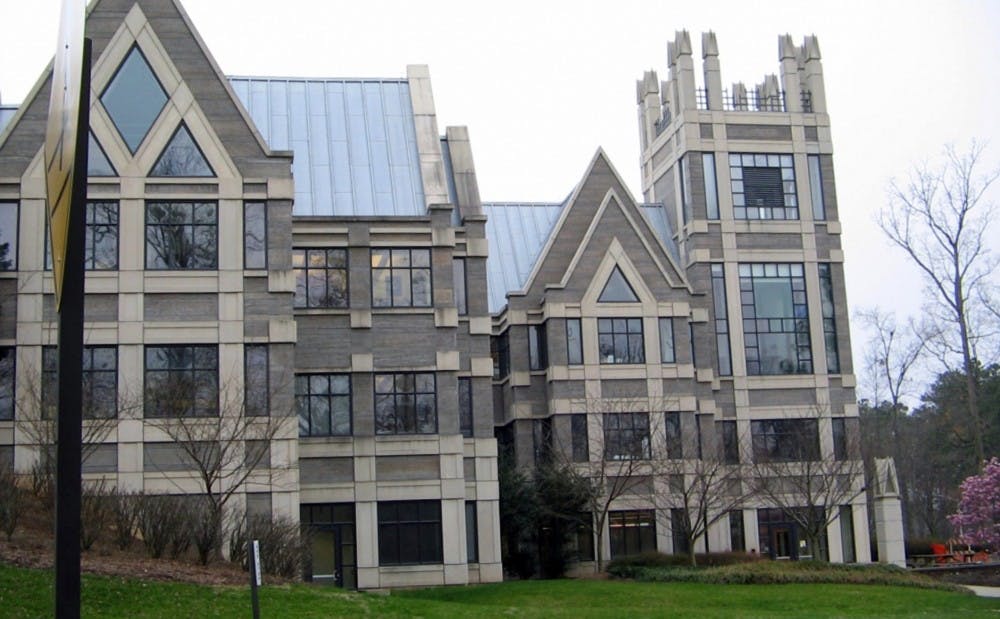Stories come in many forms, from the written word to the silver screen. One form that has recently flourished, though, is the podcast.
According to surveys conducted by Edison Research and Triton Digital, podcast listening has nearly quadrupled over the past 10 years.
Carol Jackson, digital communications strategist at the Sanford School of Public Policy, said she has witnessed this trend at Duke. Jackson produces “Policy 360” and co-produces “Ways & Means,” podcasts funded by the Sanford Innovation & Impact Fund. “Policy 360” is a series of conversations hosted by Kelly Brownell, dean of Sanford, while “Ways & Means” showcases faculty research by including “real-life stories” and adding in a script to tie the pieces together.
A self-described fan of the audio medium, Jackson previously worked in television before moving to radio. She felt that the artificial lighting needed for television created an unnatural atmosphere, while audio did not have that issue.
“When I found radio, I was like, ‘Wow, this is so—it’s intimate,'” Jackson said. “It’s almost like you can hear the person better if you can’t see them.”
The podcast movement has trickled to other faculty and students as well. Alex Gonzalez, senior and co-founder and co-president of Hear at Duke, had also been interested in television and film for a while and first discovered podcasts during her freshman year when the popular true-crime series “Serial” came out.
“I was hooked,” Gonzalez said. “I would take extended breaks between studying to listen to it.”
This experience spurred Gonzalez and her friend, fellow senior Maria Luisa Frasson-Nori, to start a podcast of their own, “Hear at Duke.” Gonzalez said their work was picked up by the Language, Arts & Media Program, leading to funding and brand expansion. Since then, Hear at Duke has become an organization that produces its own podcasts as well as offers resources and advice to aspiring podcasters.
Alison Jones, senior writer in the Office of News and Communications, also started an audio working group about two years ago to help people create their own audio projects. She said she had noticed an interest in podcasting but no way for people to get together, discuss their projects and receive feedback.
“It brings together people who wouldn’t necessarily cross paths,” Jones said. “We’re united by our love of audio.”
Jones mentioned that one reason Duke has a “vibrant audio culture” is John Biewen, audio program director at the Center for Documentary Studies and instructor in documentary studies. Biewen has taught two classes, Introduction to Audio Documentary and The Short Audio Documentary, for nearly a dozen years. These classes are entry-level classes that teach students the basic skills to work with the audio medium. Biewen has his own podcast that started about two years ago, titled “Scene on Radio.”
Senior Lou Kendaru said she took one of Biewen’s classes in her sophomore year because she was interested in radio. She has now produced the first episode of her podcast “kiss + tell,” which she released Sept. 11. Kendaru’s podcast explores her interests in sex education and relationships and “embraces the awkward [moments]” that come with the topic
“This project is really marrying my two loves together,” Kendaru said.
Groups on campus have also begun to incorporate audio into their existing platforms. For instance, The Standard started two podcasts last spring, “Everyone’s an Expert” and “Two People Talking.” Laure Bender, senior and editor of video and audio for the magazine, said podcasts are another medium for The Standard to showcase student voices.
Bender said while she doesn’t make podcasts, she does enjoy listening to them, often while walking to and from work Kendaru expressed the same sentiment.
“If Duke students are going to listen to podcasts for one reason, it’s this: you can do stuff while listening to podcasts,” Kendaru said.
Jones said this on-demand style allows more people to engage with audio. Within the realm of podcasts, there is still a wide range of lengths and types, from a few minutes of interview to an hour-long scripted story. Biewen agreed, remarking that there exists an important distinction between the talk show style and the documentary style because they require different skills.
But Biewen also noted that starting a podcast is “very accessible” because it requires minimal equipment—just a recording device, a laptop for editing and an Internet connection. Because of this accessibility, he said the field has exploded, with now hundreds of thousands of podcasts and for-profit companies that had not existed before.
It will be interesting, he said, to see what happens to smaller independent shows as larger companies come into play and the field becomes more organized and professionalized. Kendaru, though, emphasized the fundamentals of why people enjoy podcasts.
“No matter how much technology we have, the human voice is always going to be the driver of storytelling,” Kendaru said.
Get The Chronicle straight to your inbox
Sign up for our weekly newsletter. Cancel at any time.

